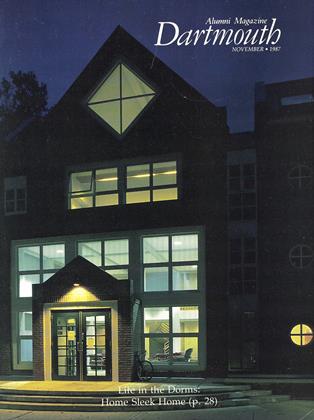"In Hanover they called him the Big Green Train and his athletic achievements are still the stuff of legend."
NOVEMBER • 1987 David Shribman '76 in 100 Years of Dartmouth Football"In Hanover they called him the Big Green Train and his athletic achievements are still the stuff of legend." David Shribman '76 in 100 Years of Dartmouth Football NOVEMBER • 1987
He wore a number of different uniforms during his long and noted career. Football, hockey, the Navy, and a judge's robes. He was arguably Dartmouth's greatest athlete, certainly the best of his era. He was one of only two men inducted into both the Football Hall of Fame and the Hockey Hall of Fame. And as a United States Attorney he tackled the Mafia. He was Myles Lane, and he died on August 6 at the age of 84.
Myles was born in Melrose, Mass., and starred in three sports at high school and the at the Huntington School. Dartmouth also awarded him letters in football, hockey, and baseball three years running. Myles was a member of both Phi Gamma Delta and Sphinx. On the field he amassed a total of 307 points playing football for Dartmouth, a record which still stands.
As a sophomore, when the Big Green team was acclaimed as the national collegiate champion, Myles caught two touchdown passes and threw another in the climactic 33-7 win over the University of Chicago. And in his senior year his 125 points not only set a single-season record for the College but also earned him top scoring honors in the nation. The Football Hall of Fame Inducted Myles in 1970, Hockey in 1973.
As a result of his hockey record he was team captain as a senior Myles was signed by the New York Rangers and became the first American collegian to enter the ranks of professional hockey. Sold a year later to the Boston Bruins, he played on the Bruins's championship Stanley Cup team in 1929 and continued with the Bruins till 1934.
In 1932 and 1933 he was also head football coach at Boston College and in 1934 was backfield coach at Harvard. His earnings helped finance his studies at Boston College Law School, where he graduated in 1934.
He joined the New York law firm of O'Connor and Farber. Three years later he was appointed an assistant United States attorney for the Southern District of New York.
Myles spent four years in the navy during World War II, leaving as a lieutenant commander. After the war he rejoined the U.S. attorney's office, becoming chief assistant. In 1951 he was appointed U.S. attorney, a position he held until 1953. During this period he prosecuted some of the most notorious crime bosses, including Frank Costello.
Myles returned to private law practice until 1958 when Gov. W. Averill Har-riman appointed him to the State Inves-tigation Commission. As chairman he helped expose racketeering and Mafia influence at Kennedy International Airort in the late 19605, and the commission also looked into issues such as school-building flaws, hospital abuses, and bid-rigging.
In 1968 he left to become a Supreme Court justice in Manhattan and six years later was appointed to the Appellate Division of the Supreme Court, a position from which he retired in 1979.
Myles was active in Dartmouth affairs, serving as president of the General Association of Dartmouth Alumni from 1952-53 and as a member of the Alumni Council.
During his last years Myles suffered from Alzheimer's disease and for the past three years had been in the Mary Manning Walsh nursing home in Manhattan. When he died there in August Myles's family, Dartmouth, and the community he served lost a remarkable man. Our sympathies go to his survivors, his wife, Margaret (McCandless), brother Francis, and sister Eileen Sullivan.
OS SKINNER '28
 View Full Issue
View Full Issue
More From This Issue
-
 Feature
FeatureTaking the Sky
November 1987 By Glenn Tremml '82 -
 Feature
FeatureAfter Iran: Can We Have a Foreign Policy?
November 1987 By Stephen Bosworth '61 -
 Feature
FeatureAre Conservatives Being Silenced?
November 1987 By Lee Michaelides -
 Feature
FeatureRooming with Style
November 1987 By Karen Endicott -
 Feature
FeatureCreating Creators
November 1987 By Lawrence Biemiller -
 Feature
FeatureThe Right Man at the Right Time
November 1987







